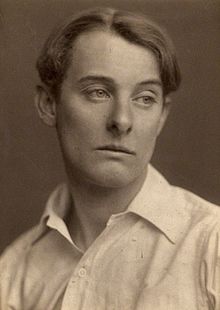Alfred Douglas
| Lord Alfred Douglas | |
|---|---|

Alfred Douglas in 1903
(by George Charles Beresford) |
|
| Born |
22 October 1870 Powick, Worcestershire, England |
| Died | 20 March 1945 (aged 74) Lancing, Sussex, England |
| Resting place | Friary Church of St Francis and St Anthony, Crawley |
| Occupation | Poet |
| Nationality | British |
| Education | Winchester College, Wixenford School |
| Alma mater | Magdalen College, Oxford |
| Spouse | Olive Custance (1902–1944) |
Lord Alfred Bruce Douglas (22 October 1870 – 20 March 1945), nicknamed Bosie, was a British author, poet, translator, and political commentator, better known as the friend and lover of Oscar Wilde. Much of his early poetry was Uranian in theme, though he tended, later in life, to distance himself from both Wilde's influence and his own role as a Uranian poet. Politically he would describe himself as "a strong Conservative of the 'Diehard' variety".
Douglas was born at Ham Hill House in Powick, Worcestershire, the third son of John Douglas, 9th Marquess of Queensberry and his first wife Sibyl Montgomery. He was his mother's favourite child; she called him Bosie (a derivative of "boysie", as in boy), a nickname which stuck for the rest of his life. His mother successfully sued for divorce in 1887 on the grounds of his father's adultery. The Marquess married Ethel Weeden in 1893 but the marriage was annulled the following year.
Douglas was educated at Wixenford School,Winchester College (1884–88) and Magdalen College, Oxford (1889–93), which he left without obtaining a degree. At Oxford, he edited an undergraduate journal, The Spirit Lamp (1892–3), an activity that intensified the constant conflict between him and his father. Their relationship had always been a strained one and during the Queensberry-Wilde feud, Douglas sided with Wilde, even encouraging Wilde to prosecute the Marquess for libel. In 1893, Douglas had a brief affair with George Ives.
In 1858, before Douglas's birth, his grandfather, the 8th Marquess of Queensberry, had died in what was reported as a shooting accident, but was widely believed to have been suicide. In 1862, his widowed grandmother, Lady Queensberry, converted to Roman Catholicism and took her children to live in Paris.
...
Wikipedia
